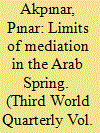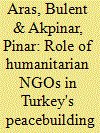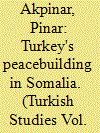|
|
|
Sort Order |
|
|
|
Items / Page
|
|
|
|
|
|
|
| Srl | Item |
| 1 |
ID:
149445


|
|
|
|
|
| Summary/Abstract |
This article investigates the limits of mediation during the Arab Spring by focusing on the case of Syria. It examines international mediation attempts by states, non-governmental organisation, and regional and international organisations. Drawing largely on Bercovitch and Gartner’s framework of mediation outcomes, the study suggests that the directive strategy applied by Staffan de Mistura through the United Nations–Arab League joint effort has achieved the closest outcome towards a full settlement. Mediation in the Syrian crisis has been limited by disagreement among key actors, lack of commitment and of coordinated efforts, questions of representation and legitimacy, and lack of neutrality and of inclusiveness. Despite its limits, mediation has been able to achieve important gains such as the longest and broadest ceasefire, access to the majority of besieged areas, considerable de-escalation of violence, commitment among key actors towards a resolution, and resolution of incidents of hostage crises. Despite its limits, mediation is likely to play an important role vis-à-vis the Arab Spring.
|
|
|
|
|
|
|
|
|
|
|
|
|
|
|
|
| 2 |
ID:
139197


|
|
|
|
|
| Summary/Abstract |
This article illuminates the role of international HNGOs in Turkey's peacebuilding. Turkish HNGOs pursue low-level peacebuilding, focusing on interaction with grassroots, as opposed to the high-level peacebuilding of the state based on official interaction. Despite being independent, at times they become subsumed by the discourse, priorities and policies of the government and develop an interest in shaping official policies which carry the risk of politicizing the aid. While some of their key features such as flexibility, absence of conditionality, ensuring sustainability, relying on private donations and pursuing advocacy follow the mainstream peacebuilding lines, others such as culture and religion as catalysts and representing and promoting Turkey abroad demonstrate a deviation. Although the institutional consolidation of these HNGOs as a sector remains a distant goal, they are not likely to disappear given the considerable societal and political will behind their work. Their success depends on building a comprehensive strategy with efficient coordination and cooperation in a pluralist environment.
|
|
|
|
|
|
|
|
|
|
|
|
|
|
|
|
| 3 |
ID:
126678


|
|
|
|
|
| Publication |
2013.
|
| Summary/Abstract |
This study discusses the limits of Turkey's discourse and practice on humanitarian diplomacy with respect to its peacebuilding in Somalia. The Turkish model of humanitarian diplomacy attempts to find a balance between conscience and interest. It is multi-track in that it pursues diplomacy through official, civic and business channels. Although there is a humanitarian dimension to Turkey's policy in Somalia, there is also a dimension of interest and power, indicating a long-term projection of securing a role for itself in regional and international politics. As tools of humanitarian diplomacy, mediation and peacebuilding provide Turkey with regional and global prestige, status and leverage ensuring safe entry into volatile and dangerous post-conflict zones such as Somalia. Humanitarian diplomacy is an ideal that adds a human dimension to diplomacy. Its realization is limited by the realities on the ground, the interests of the intervening country, the public support for humanitarian diplomacy, the capacity of the intervening country as well as by the need for regional recognition and international support.
|
|
|
|
|
|
|
|
|
|
|
|
|
|
|
|
|
|
|
|
|